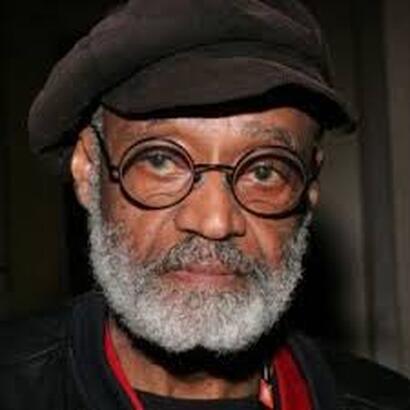|
On August 21, 1932, Melvin Peebles was born to parents Edwin Griffin and Marion Peebles in Chicago, Illinois. Edwin Griffin worked as a tailor in Phoenix, Illinois, the same suburb where Van Peebles attended Thornton Township High School, graduating in 1949. After high school he attended West Virginia State College then transferred to Ohio Wesleyan College, graduating with a degree in English Literature in 1954. Thirteen days after his college graduation Van Peebles joined the Air Force where he served for three and a half years. In 1956, Van Peebles spent time in Mexico, where he married Maria Marx who was a German actress and photographer; the couple produced Van Peebles’ eldest son actor and director Mario Van Peebles. While living in Mexico Van Peebles earned a living as a painter, in 1958 he moved to San Francisco, California where he found work as a cable car grip man. In 1957, Van Peebles made his first short films Sunlight and Three Pickup Men for Herrick as a new filmmaker. With no previous experience in film making and his first two short films in hand, Van Peebles set out to Hollywood to become a film director. Unfortunately, his films were not well received and he didn’t find anyone who wanted to work with him. While in New York City, he was offered a chance to screen his films in France, this meeting led to him and his family moving to the Netherlands and Van Peebles working for the Dutch National Theater. While living in the Netherlands Melvin Peebles changed his name to Melvin Van Peebles, to help him find work. Van Peebles was starting to gain recognition for his films; he was invited to work in Paris by Henri Langlois a French film archivist and influential film figure. Langlois hired Van Peebles to translate Mad Magazine into French, to do so, Van Peebles learned French and began to change the course of his career and film history. Van Peebles began writing plays using a French style of songwriting that mixed singing and speaking. Van Peebles began writing novels in the 1960s; his first four novels were The Big Heart, A Bear for the F.B.I., The True American, and Harlem Party. He also wrote a collection of short stories in French before releasing his French short film Cinq Cent Balles in 1965. In 1968, Van Peebles made his first feature-length film titled The Story of a Three-Day Pass, which was successful enough to attract Hollywood producers; because of his name being Van Peebles the Hollywood producers thought he was a white man. In 1968, Van Peebles also released his first studio album as a recording artist titled Brer Soul. The success of The Story of a Three-Day Pass led to Van Peebles being selected by Columbia Pictures to direct the film The Watermelon Man in 1970. Van Peebles was also selected to direct the filming of the Powder Ridge Rock Festival before it was canceled by a court injunction. In 1971, Melvin Van Peebles rocked Hollywood and the black film industry when he made his groundbreaking film Sweet Sweetback's Baadasssss Song. Van Peebles along with a fifty-thousand dollar loan from Bill Cosby funded the film. Van Peebles wrote the script, directed the film, edited the film, wrote the score for the film, and he also developed and directed the marketing campaign for the film. It is considered a groundbreaking film because it created the “Blaxploitation” era in film, its message resonated with the Black Panthers and other groups fighting for black liberation, it grossed over ten million dollars, and showcased the brilliance of Melvin Van Peebles to the world. In 1972, Van Peebles wrote the composition for the theater adaptation of his novel Harlem Party titled “Don’t Pay Us Cheap”, his work on the music and the book led to Van Peebles being nominated for two Tony awards. Van Peebles was also nominated for a Tony award as a composer and lyricist for the play “Ain’t Supposed to Die a Natural Death.” In 1976, Van Peebles wrote the theme song for the television series "Just an Old Sweet Song", in 1977, he wrote the screenplay for the biopic "Greased Lightning", in 1978, he wrote the pilot for the television show “Down Home”, before making his television debut as an actor in the 1981 series “The Sophisticated Gents”. Van Peebles began working in the American Stock Exchange as an options trader in the 1980’s, where he would ultimately find success. In 1986, he wrote the book Bold Money: A New Way to Play the Options Market, and in 1987 he opened Van Peebles and Hayes Municipal Securities, which was a municipal bonds firm. In 1995, Van Peebles co-starred in the live-action version of the Japanese comic Fist of the North Star, in 2005, Van Peebles was the focus of the documentary How to Eat Your Watermelon in White Company, later in 2005, Van Peebles along with Ossie Davis and Gordon Parks were featured in the documentary Unstoppable. As a professional creator Melvin Van Peebles wrote thirteen books; directed, wrote, scored or produced over 13 films; earned ten extra writing credits working on films in various capacities; has 16 credits as an actor; wrote six plays; released seven studio albums; and four movie soundtrack albums. Van Peebles was truly a man that refused to be held back by the racism in America. He earned a chance to make films in Europe but ended up changing the film industry in America and around the world. He helped Hollywood and the rest of the world see that black people could write, direct, act, produce films, create the music, and even perform the music. He made his first two short-films not understanding how to make a movie, but in the end, he fully understood that he must take control of his career to truly make a difference in the film. Mr. Melvin Van Peebles, we proudly stand on your shoulders. J. A. Ward Click here to learn more about the On the Shoulders of Giants book series!!! References:
https://www.britannica.com/biography/Melvin-Van-Peebles https://aaregistry.org/story/melvin-van-peebles-born/ https://www.blackpast.org/african-american-history/van-peebles-melvin-1932/ -https://en.wikipedia.org/wiki/Melvin_Van_Peebles
1 Comment
Cassie Hammock
7/2/2019 06:48:21 am
I love Melvin Van Peebles work thank you for acknowledging this groundbreaking writer reillent giant of a Black man who paved the way for Black theater today.
Reply
Leave a Reply. |
Details
Categories
All
Click Here to join our mailing list
|
Contact Us: |
Connect With Us |
Site powered by PIT Web Design



 RSS Feed
RSS Feed



